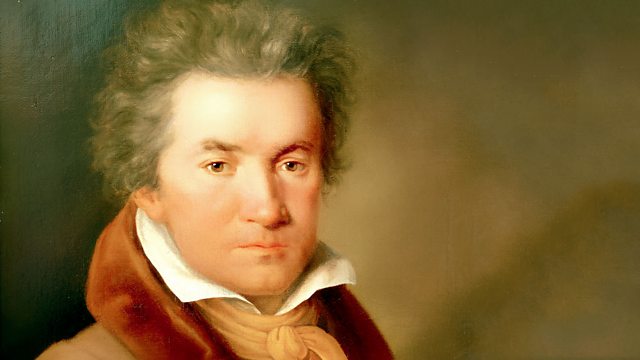
Beethoven's Last Piano Sonatas
Donald Macleod explores the period 1820-2, when Beethoven composes his final piano sonatas.
Donald Macleod explores the life and music of Beethoven, taking a snapshot view through the window of five of the composer's thirty-two piano sonatas.
1820-2 was a period when Beethoven was consumed with composing, what he thought was his greatest work to date, the Missa Solemnis opus 123. This huge choral undertaking was like his opera, worked on over a long period, with breaks for the composer to focus upon other works. During this period, Beethoven returned to re-editing some Scottish folksongs for publication, including 'Music, Love and Wine', and 'Sally in our Alley'.
By this time however, Beethoven was often seen walking the streets of Vienna, ranting to himself, or singing at the top of his voice. He looked dishevelled, and boys would openly mock him in the street, although he couldn't hear them. Rossini and Weber both visited Beethoven, and was saddened to see the poor state they found him in. Rossini even tried to get the Austrian Court to step in and assist Beethoven financially, but this appeal was turned down, as Beethoven was considered a hopeless case, mentally unbalanced.
It was during this same period where Beethoven was seen walking the streets like a vagrant, and even arrested by the Police for peering into windows, that he interrupted his work on the Missa Solemnis to complete his final three piano sonatas. These piano works, including the Piano Sonata no.30 opus 109, pushed the boundaries of traditional sonata form, with none of the movements being what you'd expect.
Last on
More episodes
Next
You are at the last episode
Music Played
-
![]()
Ludwig van Beethoven
Mass in D major Op.123 (Missa solemnis)
Conductor: John Eliot GARDINER Performer: Alastair MILES - Bass Performer: Catherine ROBBIN - Mezzo-soprano Performer: Charlotte MARGIONO - Soprano Performer: William KENDALL - Tenor Performer: English Baroque Soloists Performer: Monteverdi Choir.
- ARCHIV.
- 429-779-2.
-
![]()
Ludwig van Beethoven
25 Scottish songs Op.108 for voice and piano trio
Performer: Catrin WYN-DAVIES - Soprano Performer: Elizabeth LAYTON - Violin Performer: John Mark AINSLEY - Tenor Performer: Krysia OSOSTOWICZ - Violin Performer: Malcolm MARTINEAU - Piano Performer: Marieke BLANKESTIJN - Violin Performer: Thomas ALLEN - Baritone Performer: Toby SPENCE - Tenor Performer: Ursula SMITH - Cello
- Deutsche Grammophon.
- 4775128.
-
![]()
Ludwig van Beethoven
Sonata no. 30 in E major Op.109 for piano
Performer: Richard GOODE - Piano
- ELEKTRA/NONESUCH.
- 979-211-2.
-
![]()
Ludwig van Beethoven
March in C major WoO.20 for military band
Conductor: Antonio PLOTINO Performer: Columbus Orchestra Di Genova Performer: Otteto Italiano
- arts.
- 475512.
-
![]()
Ludwig van Beethoven
Mass in D major Op.123 (Missa solemnis)
Conductor: John Eliot GARDINER Performer: Alastair MILES - Bass Performer: Catherine ROBBIN - Mezzo-soprano Performer: Charlotte MARGIONO - Soprano Performer: William KENDALL - Tenor Performer: Monteverdi Choir.
- ARCHIV.
- 429-779-2.
-
![]()
Ludwig van Beethoven
Kyrie from Missa Solemnis Op.123
- Archiv.
-
![]()
Ludwig van Beethoven
Music, Love and Wine, and Sally in our Alley, from 25 Scottish Songs Op.108
- Deutsche Grammophon.
-
![]()
Ludwig van Beethoven
Piano Sonata no.30 in E major, Op.109
- Elektra.
-
![]()
Ludwig van Beethoven
March and Trio WoO20
- Arts.
-
![]()
Ludwig van Beethoven
Agnus Dei from Missa Solemnis Op.123
- Archiv.
Broadcasts
- Fri 27 Jul 2012 12:00����ý Radio 3
- Fri 27 Jul 2012 20:00����ý Radio 3
Beethoven Unleashed – the box set
What was really wrong with Beethoven?
Composers A to Z
Who knew? Five eye-opening stories from Composer of the Week
Five reasons why we love Parry's Jerusalem
What is the strange power of Jerusalem which makes strong men weep?
A man out of time – why Parry's music and ideas were at odds with his image...
The composer of Jerusalem was very far from the conservative figure his image suggests.
Composer Help Page
Find resources and contacts for composers from within the classical music industry.





